Analysis of the Migration Law Case: Le v Minister [2019]
VerifiedAdded on 2022/08/13
|9
|2155
|17
Report
AI Summary
This report analyzes the migration law case of Le v Minister [2019] FCCA 2167, focusing on the implications for partner visa applications, specifically when condition 8503 is imposed. The case involves an applicant with a visitor visa (subclass 600) who is pregnant and seeking an onshore partner visa. The analysis explores the validity of the application under section 46(1A) of the Migration Act, the impact of condition 8503, and the circumstances under which this condition can be waived. The report also examines the principles of statutory interpretation applied by the judge, highlighting how the court addressed issues of fairness and justice in the context of the Migration Act. The case highlights the complexities of Australian migration law and the stringent requirements for visa applications, especially when existing visas have conditions restricting further stay.
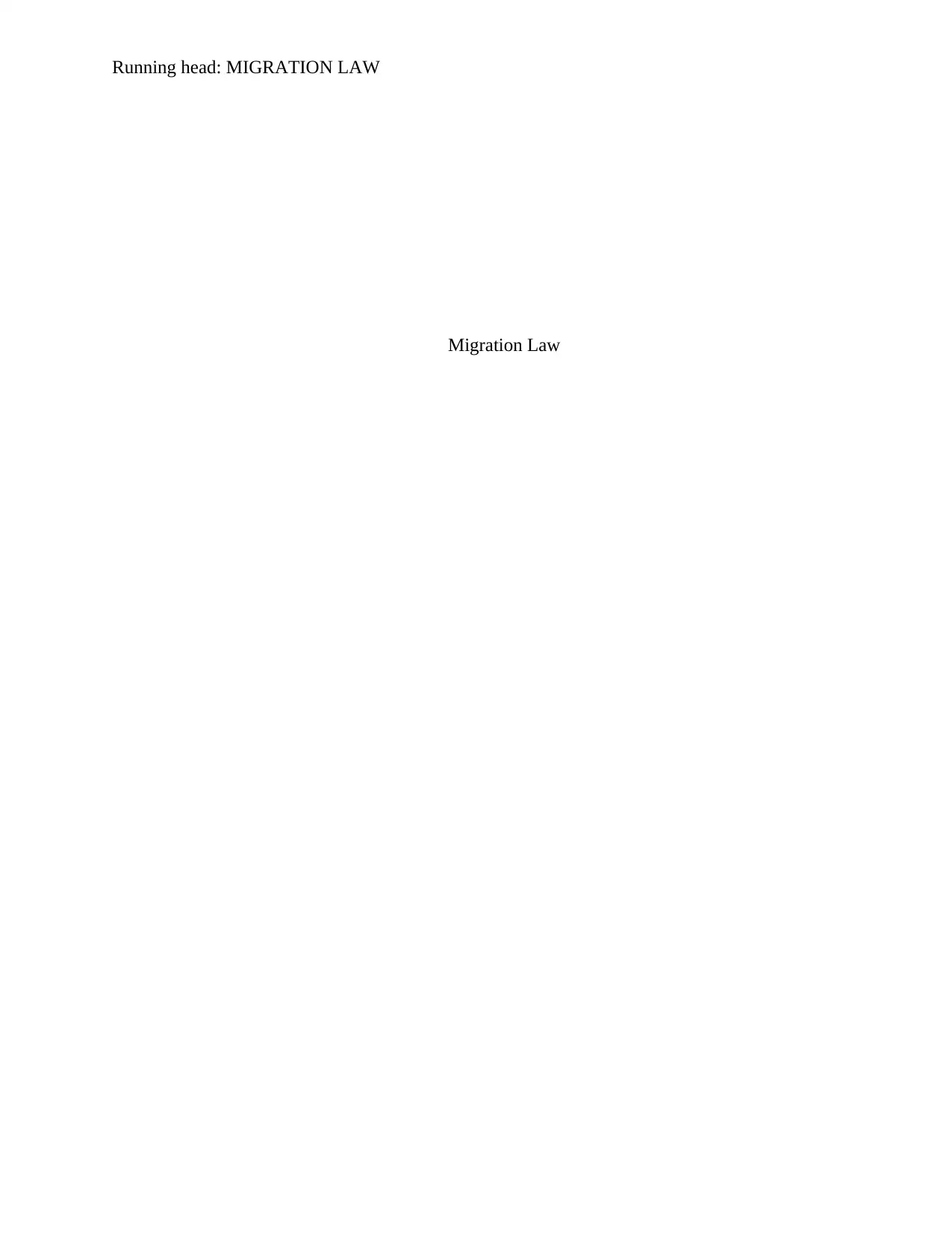
Running head: MIGRATION LAW
Migration Law
Migration Law
Paraphrase This Document
Need a fresh take? Get an instant paraphrase of this document with our AI Paraphraser
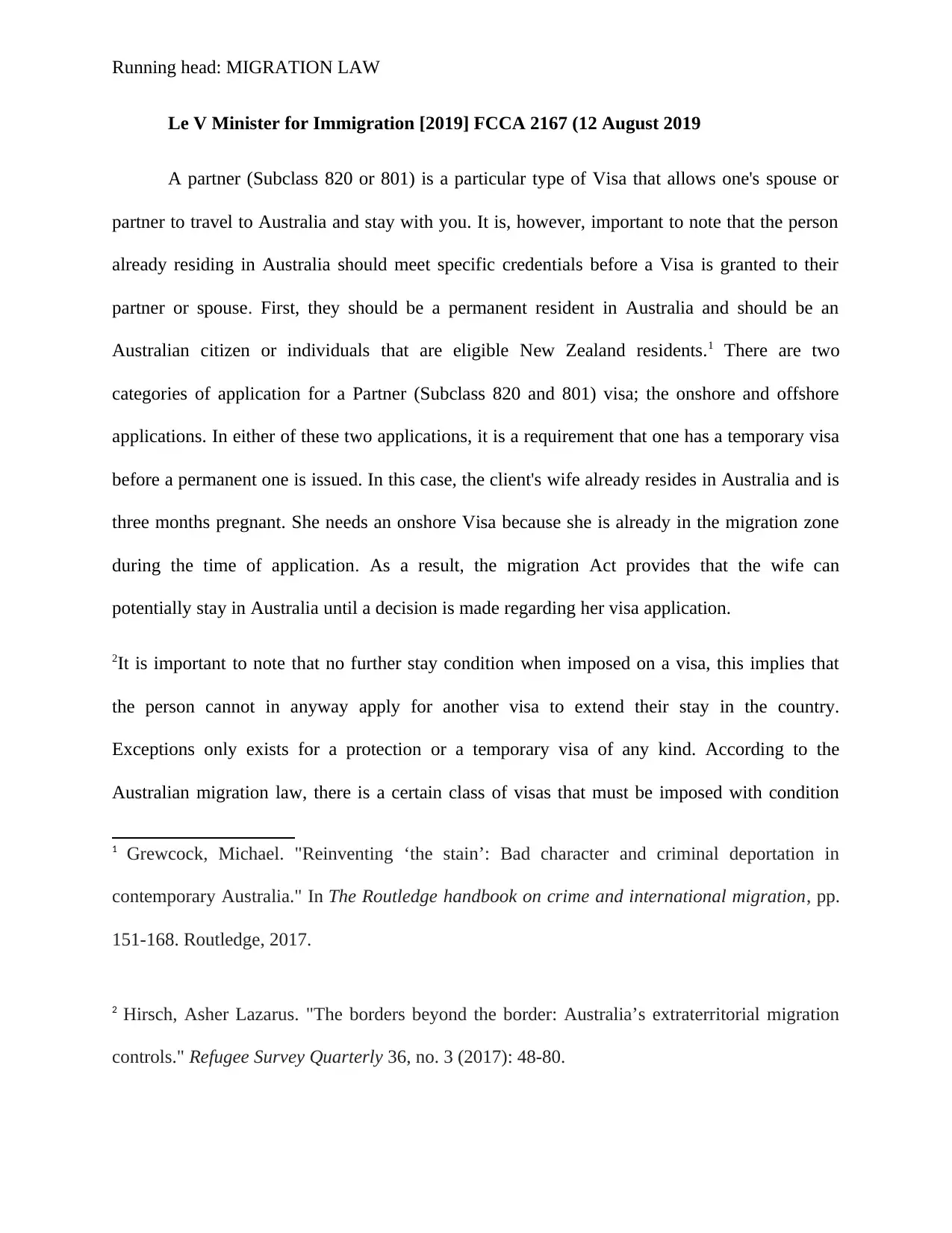
Running head: MIGRATION LAW
Le V Minister for Immigration [2019] FCCA 2167 (12 August 2019
A partner (Subclass 820 or 801) is a particular type of Visa that allows one's spouse or
partner to travel to Australia and stay with you. It is, however, important to note that the person
already residing in Australia should meet specific credentials before a Visa is granted to their
partner or spouse. First, they should be a permanent resident in Australia and should be an
Australian citizen or individuals that are eligible New Zealand residents.1 There are two
categories of application for a Partner (Subclass 820 and 801) visa; the onshore and offshore
applications. In either of these two applications, it is a requirement that one has a temporary visa
before a permanent one is issued. In this case, the client's wife already resides in Australia and is
three months pregnant. She needs an onshore Visa because she is already in the migration zone
during the time of application. As a result, the migration Act provides that the wife can
potentially stay in Australia until a decision is made regarding her visa application.
2It is important to note that no further stay condition when imposed on a visa, this implies that
the person cannot in anyway apply for another visa to extend their stay in the country.
Exceptions only exists for a protection or a temporary visa of any kind. According to the
Australian migration law, there is a certain class of visas that must be imposed with condition
1 Grewcock, Michael. "Reinventing ‘the stain’: Bad character and criminal deportation in
contemporary Australia." In The Routledge handbook on crime and international migration, pp.
151-168. Routledge, 2017.
2 Hirsch, Asher Lazarus. "The borders beyond the border: Australia’s extraterritorial migration
controls." Refugee Survey Quarterly 36, no. 3 (2017): 48-80.
Le V Minister for Immigration [2019] FCCA 2167 (12 August 2019
A partner (Subclass 820 or 801) is a particular type of Visa that allows one's spouse or
partner to travel to Australia and stay with you. It is, however, important to note that the person
already residing in Australia should meet specific credentials before a Visa is granted to their
partner or spouse. First, they should be a permanent resident in Australia and should be an
Australian citizen or individuals that are eligible New Zealand residents.1 There are two
categories of application for a Partner (Subclass 820 and 801) visa; the onshore and offshore
applications. In either of these two applications, it is a requirement that one has a temporary visa
before a permanent one is issued. In this case, the client's wife already resides in Australia and is
three months pregnant. She needs an onshore Visa because she is already in the migration zone
during the time of application. As a result, the migration Act provides that the wife can
potentially stay in Australia until a decision is made regarding her visa application.
2It is important to note that no further stay condition when imposed on a visa, this implies that
the person cannot in anyway apply for another visa to extend their stay in the country.
Exceptions only exists for a protection or a temporary visa of any kind. According to the
Australian migration law, there is a certain class of visas that must be imposed with condition
1 Grewcock, Michael. "Reinventing ‘the stain’: Bad character and criminal deportation in
contemporary Australia." In The Routledge handbook on crime and international migration, pp.
151-168. Routledge, 2017.
2 Hirsch, Asher Lazarus. "The borders beyond the border: Australia’s extraterritorial migration
controls." Refugee Survey Quarterly 36, no. 3 (2017): 48-80.
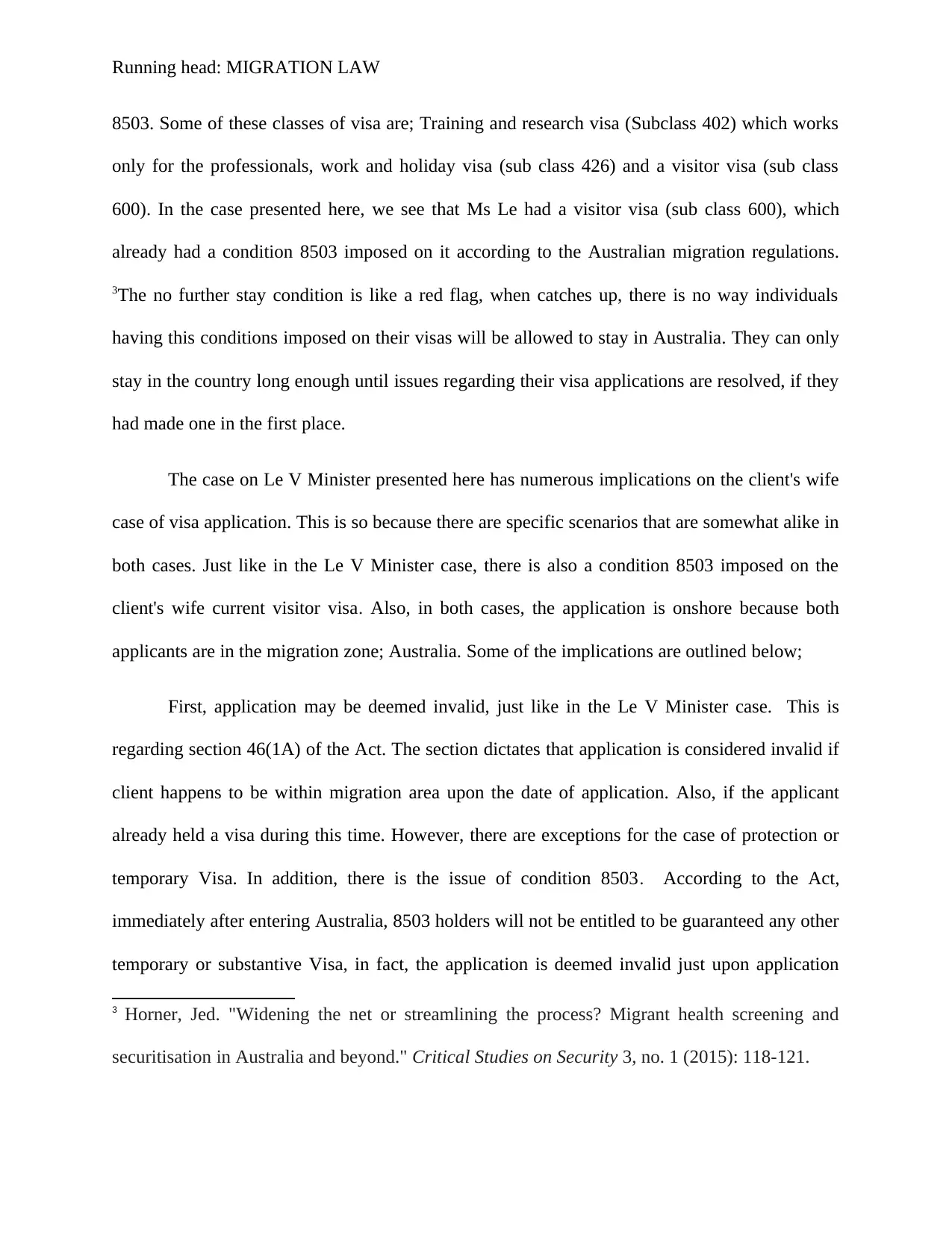
Running head: MIGRATION LAW
8503. Some of these classes of visa are; Training and research visa (Subclass 402) which works
only for the professionals, work and holiday visa (sub class 426) and a visitor visa (sub class
600). In the case presented here, we see that Ms Le had a visitor visa (sub class 600), which
already had a condition 8503 imposed on it according to the Australian migration regulations.
3The no further stay condition is like a red flag, when catches up, there is no way individuals
having this conditions imposed on their visas will be allowed to stay in Australia. They can only
stay in the country long enough until issues regarding their visa applications are resolved, if they
had made one in the first place.
The case on Le V Minister presented here has numerous implications on the client's wife
case of visa application. This is so because there are specific scenarios that are somewhat alike in
both cases. Just like in the Le V Minister case, there is also a condition 8503 imposed on the
client's wife current visitor visa. Also, in both cases, the application is onshore because both
applicants are in the migration zone; Australia. Some of the implications are outlined below;
First, application may be deemed invalid, just like in the Le V Minister case. This is
regarding section 46(1A) of the Act. The section dictates that application is considered invalid if
client happens to be within migration area upon the date of application. Also, if the applicant
already held a visa during this time. However, there are exceptions for the case of protection or
temporary Visa. In addition, there is the issue of condition 8503. According to the Act,
immediately after entering Australia, 8503 holders will not be entitled to be guaranteed any other
temporary or substantive Visa, in fact, the application is deemed invalid just upon application
3 Horner, Jed. "Widening the net or streamlining the process? Migrant health screening and
securitisation in Australia and beyond." Critical Studies on Security 3, no. 1 (2015): 118-121.
8503. Some of these classes of visa are; Training and research visa (Subclass 402) which works
only for the professionals, work and holiday visa (sub class 426) and a visitor visa (sub class
600). In the case presented here, we see that Ms Le had a visitor visa (sub class 600), which
already had a condition 8503 imposed on it according to the Australian migration regulations.
3The no further stay condition is like a red flag, when catches up, there is no way individuals
having this conditions imposed on their visas will be allowed to stay in Australia. They can only
stay in the country long enough until issues regarding their visa applications are resolved, if they
had made one in the first place.
The case on Le V Minister presented here has numerous implications on the client's wife
case of visa application. This is so because there are specific scenarios that are somewhat alike in
both cases. Just like in the Le V Minister case, there is also a condition 8503 imposed on the
client's wife current visitor visa. Also, in both cases, the application is onshore because both
applicants are in the migration zone; Australia. Some of the implications are outlined below;
First, application may be deemed invalid, just like in the Le V Minister case. This is
regarding section 46(1A) of the Act. The section dictates that application is considered invalid if
client happens to be within migration area upon the date of application. Also, if the applicant
already held a visa during this time. However, there are exceptions for the case of protection or
temporary Visa. In addition, there is the issue of condition 8503. According to the Act,
immediately after entering Australia, 8503 holders will not be entitled to be guaranteed any other
temporary or substantive Visa, in fact, the application is deemed invalid just upon application
3 Horner, Jed. "Widening the net or streamlining the process? Migrant health screening and
securitisation in Australia and beyond." Critical Studies on Security 3, no. 1 (2015): 118-121.
⊘ This is a preview!⊘
Do you want full access?
Subscribe today to unlock all pages.

Trusted by 1+ million students worldwide
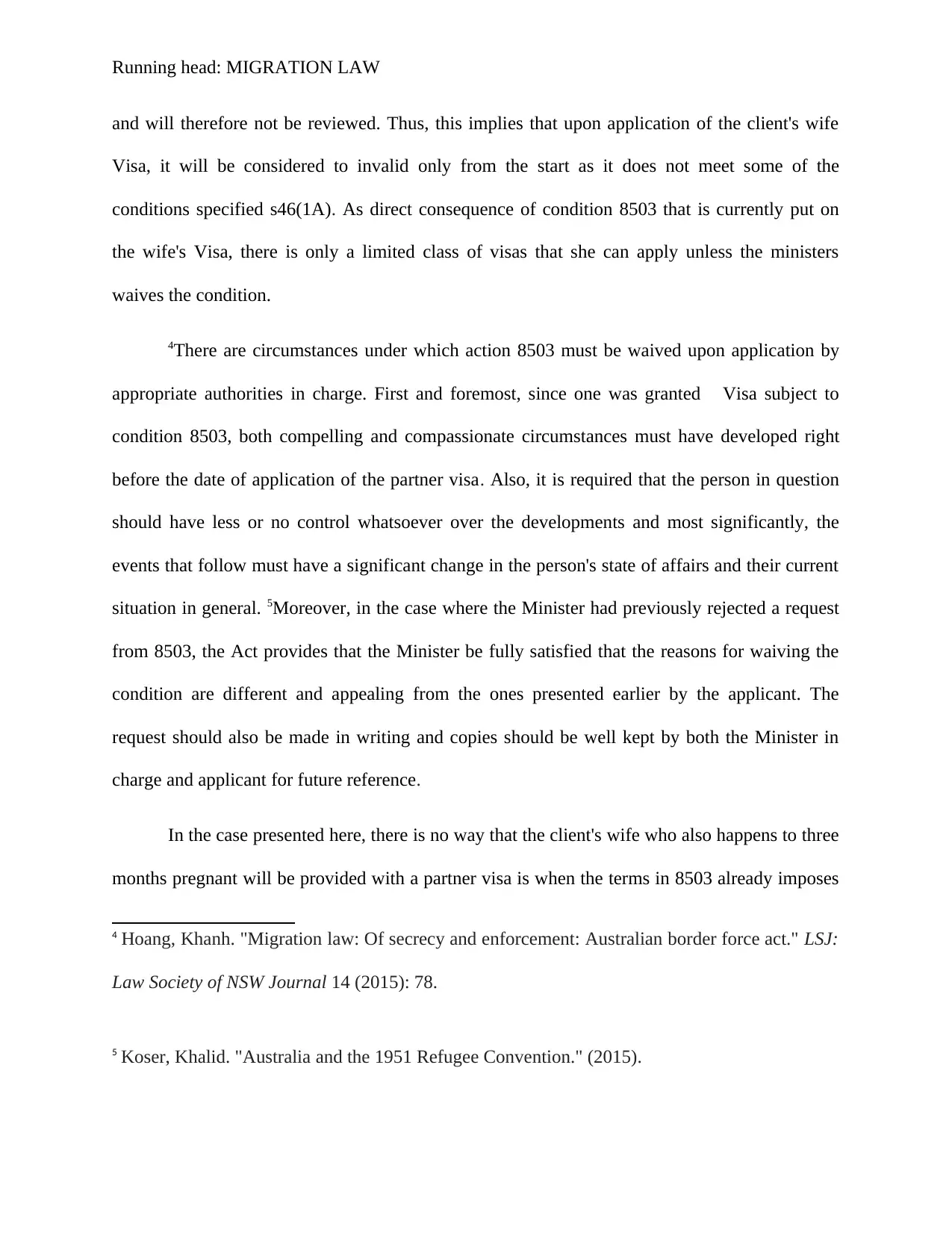
Running head: MIGRATION LAW
and will therefore not be reviewed. Thus, this implies that upon application of the client's wife
Visa, it will be considered to invalid only from the start as it does not meet some of the
conditions specified s46(1A). As direct consequence of condition 8503 that is currently put on
the wife's Visa, there is only a limited class of visas that she can apply unless the ministers
waives the condition.
4There are circumstances under which action 8503 must be waived upon application by
appropriate authorities in charge. First and foremost, since one was granted Visa subject to
condition 8503, both compelling and compassionate circumstances must have developed right
before the date of application of the partner visa. Also, it is required that the person in question
should have less or no control whatsoever over the developments and most significantly, the
events that follow must have a significant change in the person's state of affairs and their current
situation in general. 5Moreover, in the case where the Minister had previously rejected a request
from 8503, the Act provides that the Minister be fully satisfied that the reasons for waiving the
condition are different and appealing from the ones presented earlier by the applicant. The
request should also be made in writing and copies should be well kept by both the Minister in
charge and applicant for future reference.
In the case presented here, there is no way that the client's wife who also happens to three
months pregnant will be provided with a partner visa is when the terms in 8503 already imposes
4 Hoang, Khanh. "Migration law: Of secrecy and enforcement: Australian border force act." LSJ:
Law Society of NSW Journal 14 (2015): 78.
5 Koser, Khalid. "Australia and the 1951 Refugee Convention." (2015).
and will therefore not be reviewed. Thus, this implies that upon application of the client's wife
Visa, it will be considered to invalid only from the start as it does not meet some of the
conditions specified s46(1A). As direct consequence of condition 8503 that is currently put on
the wife's Visa, there is only a limited class of visas that she can apply unless the ministers
waives the condition.
4There are circumstances under which action 8503 must be waived upon application by
appropriate authorities in charge. First and foremost, since one was granted Visa subject to
condition 8503, both compelling and compassionate circumstances must have developed right
before the date of application of the partner visa. Also, it is required that the person in question
should have less or no control whatsoever over the developments and most significantly, the
events that follow must have a significant change in the person's state of affairs and their current
situation in general. 5Moreover, in the case where the Minister had previously rejected a request
from 8503, the Act provides that the Minister be fully satisfied that the reasons for waiving the
condition are different and appealing from the ones presented earlier by the applicant. The
request should also be made in writing and copies should be well kept by both the Minister in
charge and applicant for future reference.
In the case presented here, there is no way that the client's wife who also happens to three
months pregnant will be provided with a partner visa is when the terms in 8503 already imposes
4 Hoang, Khanh. "Migration law: Of secrecy and enforcement: Australian border force act." LSJ:
Law Society of NSW Journal 14 (2015): 78.
5 Koser, Khalid. "Australia and the 1951 Refugee Convention." (2015).
Paraphrase This Document
Need a fresh take? Get an instant paraphrase of this document with our AI Paraphraser
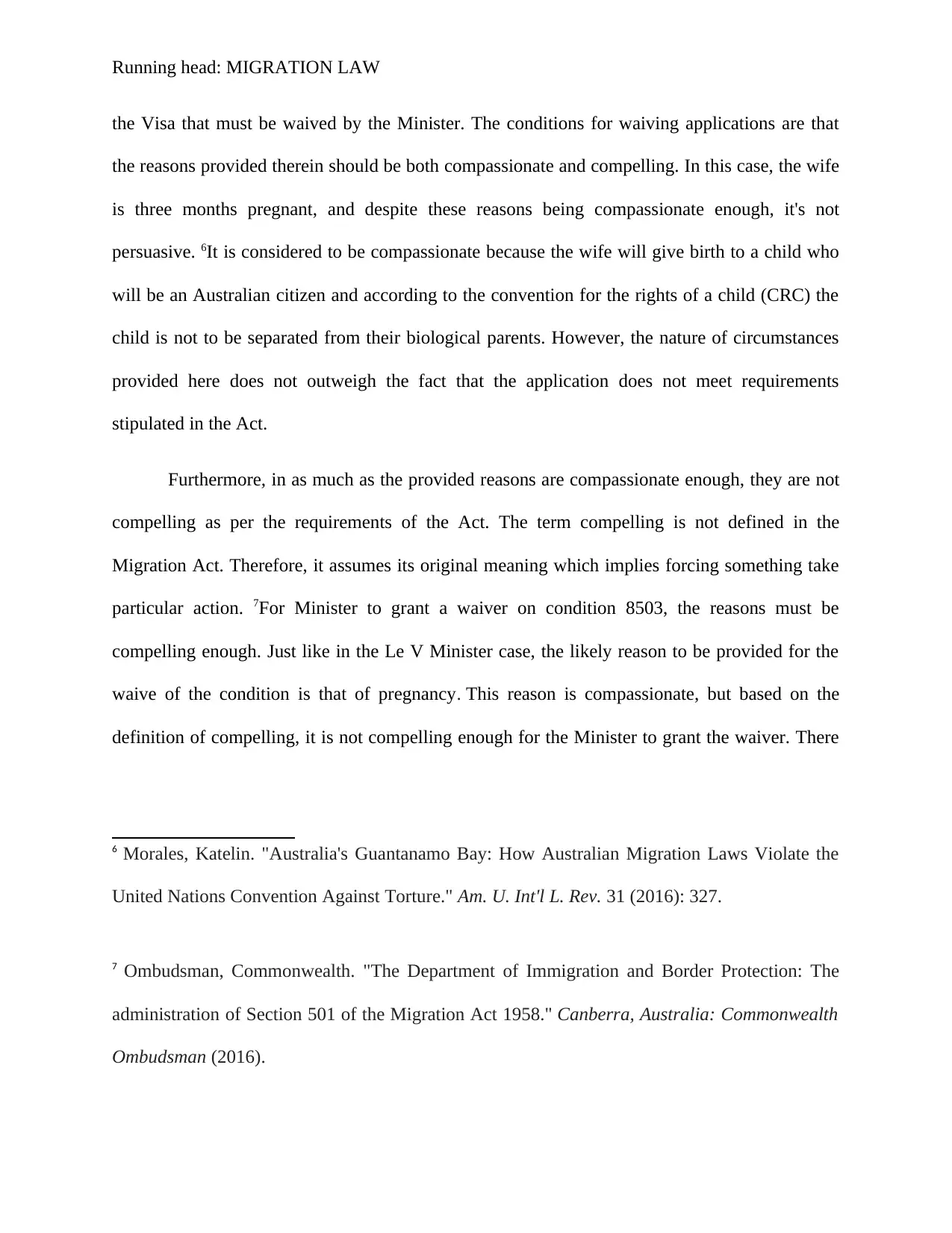
Running head: MIGRATION LAW
the Visa that must be waived by the Minister. The conditions for waiving applications are that
the reasons provided therein should be both compassionate and compelling. In this case, the wife
is three months pregnant, and despite these reasons being compassionate enough, it's not
persuasive. 6It is considered to be compassionate because the wife will give birth to a child who
will be an Australian citizen and according to the convention for the rights of a child (CRC) the
child is not to be separated from their biological parents. However, the nature of circumstances
provided here does not outweigh the fact that the application does not meet requirements
stipulated in the Act.
Furthermore, in as much as the provided reasons are compassionate enough, they are not
compelling as per the requirements of the Act. The term compelling is not defined in the
Migration Act. Therefore, it assumes its original meaning which implies forcing something take
particular action. 7For Minister to grant a waiver on condition 8503, the reasons must be
compelling enough. Just like in the Le V Minister case, the likely reason to be provided for the
waive of the condition is that of pregnancy. This reason is compassionate, but based on the
definition of compelling, it is not compelling enough for the Minister to grant the waiver. There
6 Morales, Katelin. "Australia's Guantanamo Bay: How Australian Migration Laws Violate the
United Nations Convention Against Torture." Am. U. Int'l L. Rev. 31 (2016): 327.
7 Ombudsman, Commonwealth. "The Department of Immigration and Border Protection: The
administration of Section 501 of the Migration Act 1958." Canberra, Australia: Commonwealth
Ombudsman (2016).
the Visa that must be waived by the Minister. The conditions for waiving applications are that
the reasons provided therein should be both compassionate and compelling. In this case, the wife
is three months pregnant, and despite these reasons being compassionate enough, it's not
persuasive. 6It is considered to be compassionate because the wife will give birth to a child who
will be an Australian citizen and according to the convention for the rights of a child (CRC) the
child is not to be separated from their biological parents. However, the nature of circumstances
provided here does not outweigh the fact that the application does not meet requirements
stipulated in the Act.
Furthermore, in as much as the provided reasons are compassionate enough, they are not
compelling as per the requirements of the Act. The term compelling is not defined in the
Migration Act. Therefore, it assumes its original meaning which implies forcing something take
particular action. 7For Minister to grant a waiver on condition 8503, the reasons must be
compelling enough. Just like in the Le V Minister case, the likely reason to be provided for the
waive of the condition is that of pregnancy. This reason is compassionate, but based on the
definition of compelling, it is not compelling enough for the Minister to grant the waiver. There
6 Morales, Katelin. "Australia's Guantanamo Bay: How Australian Migration Laws Violate the
United Nations Convention Against Torture." Am. U. Int'l L. Rev. 31 (2016): 327.
7 Ombudsman, Commonwealth. "The Department of Immigration and Border Protection: The
administration of Section 501 of the Migration Act 1958." Canberra, Australia: Commonwealth
Ombudsman (2016).
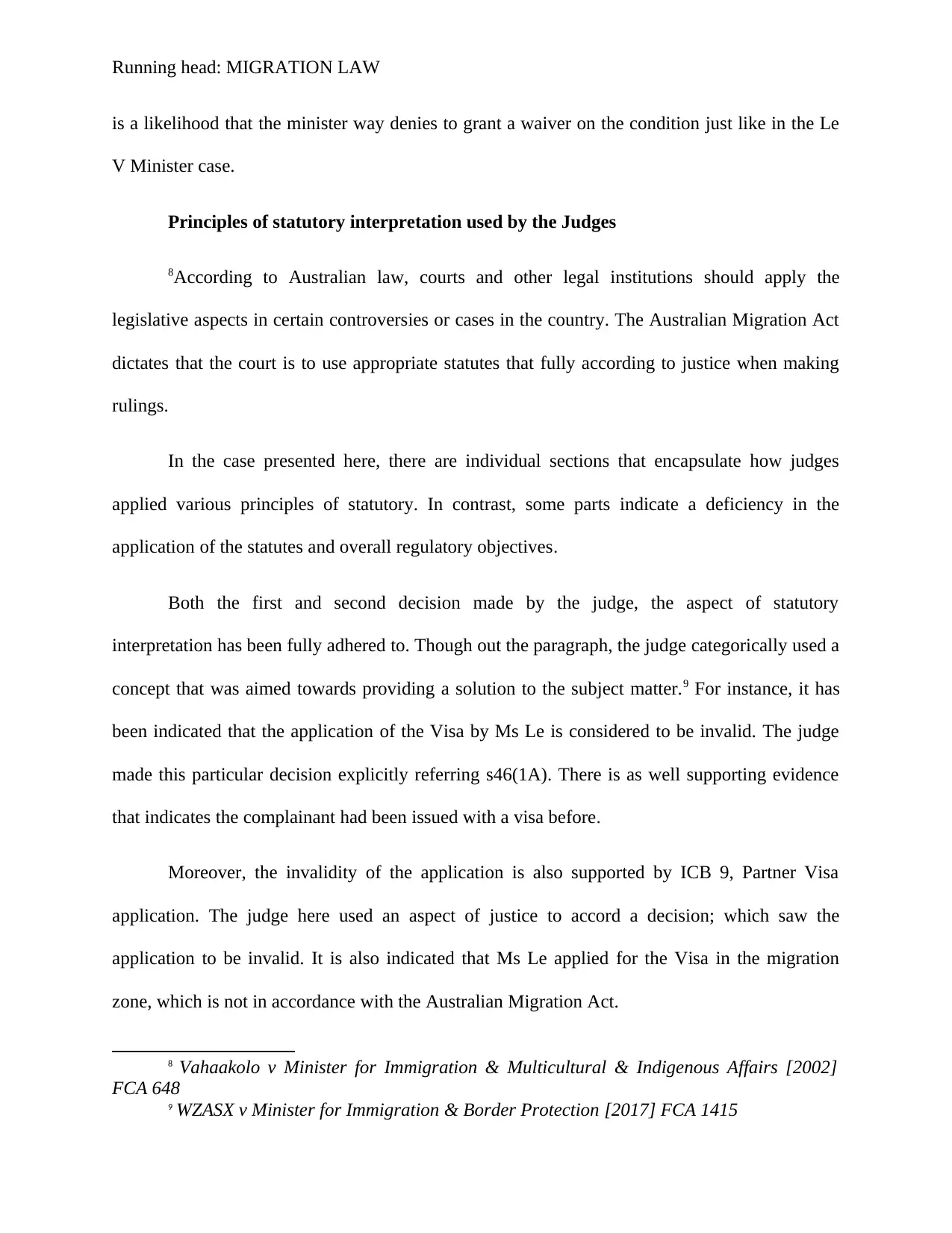
Running head: MIGRATION LAW
is a likelihood that the minister way denies to grant a waiver on the condition just like in the Le
V Minister case.
Principles of statutory interpretation used by the Judges
8According to Australian law, courts and other legal institutions should apply the
legislative aspects in certain controversies or cases in the country. The Australian Migration Act
dictates that the court is to use appropriate statutes that fully according to justice when making
rulings.
In the case presented here, there are individual sections that encapsulate how judges
applied various principles of statutory. In contrast, some parts indicate a deficiency in the
application of the statutes and overall regulatory objectives.
Both the first and second decision made by the judge, the aspect of statutory
interpretation has been fully adhered to. Though out the paragraph, the judge categorically used a
concept that was aimed towards providing a solution to the subject matter.9 For instance, it has
been indicated that the application of the Visa by Ms Le is considered to be invalid. The judge
made this particular decision explicitly referring s46(1A). There is as well supporting evidence
that indicates the complainant had been issued with a visa before.
Moreover, the invalidity of the application is also supported by ICB 9, Partner Visa
application. The judge here used an aspect of justice to accord a decision; which saw the
application to be invalid. It is also indicated that Ms Le applied for the Visa in the migration
zone, which is not in accordance with the Australian Migration Act.
8 Vahaakolo v Minister for Immigration & Multicultural & Indigenous Affairs [2002]
FCA 648
9 WZASX v Minister for Immigration & Border Protection [2017] FCA 1415
is a likelihood that the minister way denies to grant a waiver on the condition just like in the Le
V Minister case.
Principles of statutory interpretation used by the Judges
8According to Australian law, courts and other legal institutions should apply the
legislative aspects in certain controversies or cases in the country. The Australian Migration Act
dictates that the court is to use appropriate statutes that fully according to justice when making
rulings.
In the case presented here, there are individual sections that encapsulate how judges
applied various principles of statutory. In contrast, some parts indicate a deficiency in the
application of the statutes and overall regulatory objectives.
Both the first and second decision made by the judge, the aspect of statutory
interpretation has been fully adhered to. Though out the paragraph, the judge categorically used a
concept that was aimed towards providing a solution to the subject matter.9 For instance, it has
been indicated that the application of the Visa by Ms Le is considered to be invalid. The judge
made this particular decision explicitly referring s46(1A). There is as well supporting evidence
that indicates the complainant had been issued with a visa before.
Moreover, the invalidity of the application is also supported by ICB 9, Partner Visa
application. The judge here used an aspect of justice to accord a decision; which saw the
application to be invalid. It is also indicated that Ms Le applied for the Visa in the migration
zone, which is not in accordance with the Australian Migration Act.
8 Vahaakolo v Minister for Immigration & Multicultural & Indigenous Affairs [2002]
FCA 648
9 WZASX v Minister for Immigration & Border Protection [2017] FCA 1415
⊘ This is a preview!⊘
Do you want full access?
Subscribe today to unlock all pages.

Trusted by 1+ million students worldwide
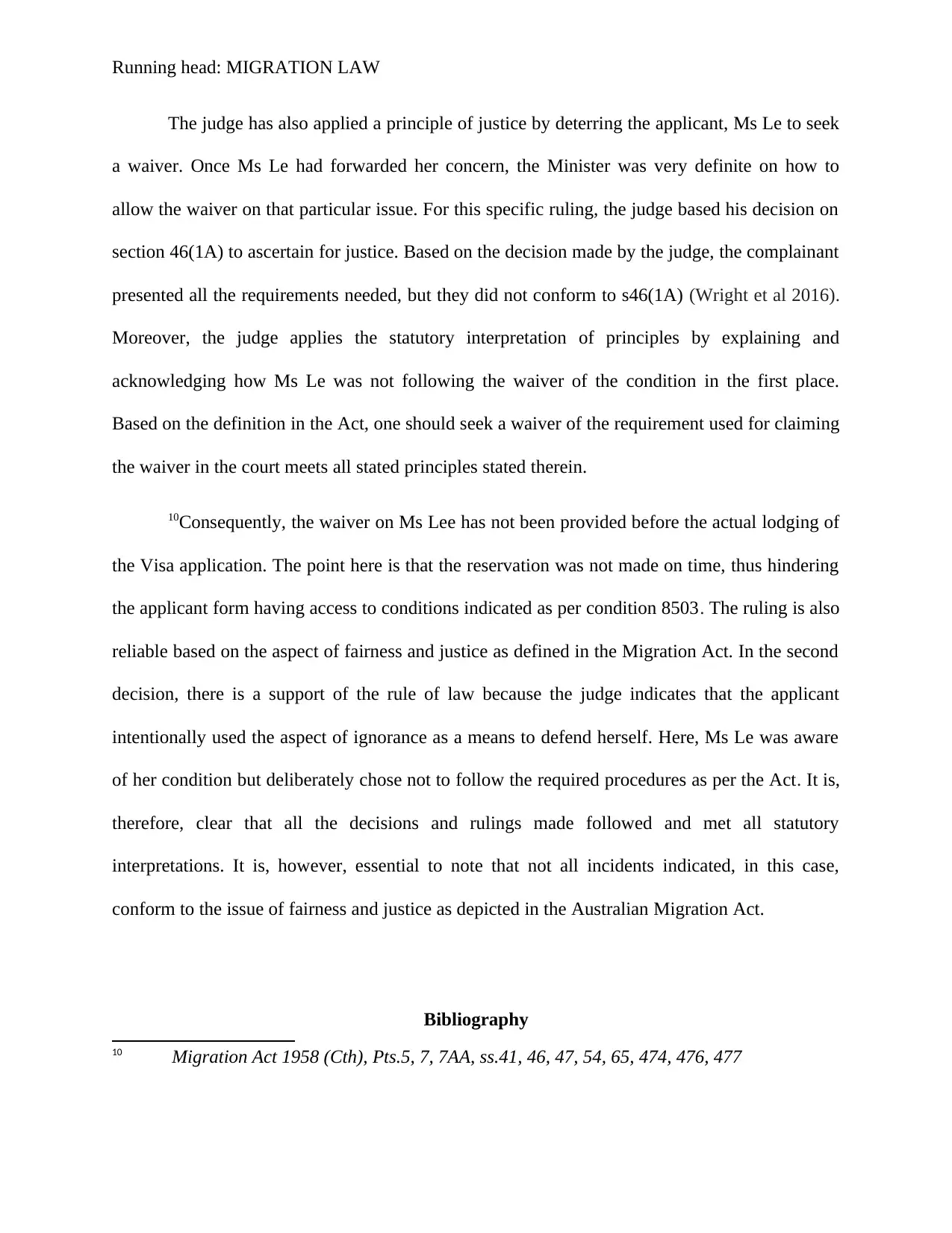
Running head: MIGRATION LAW
The judge has also applied a principle of justice by deterring the applicant, Ms Le to seek
a waiver. Once Ms Le had forwarded her concern, the Minister was very definite on how to
allow the waiver on that particular issue. For this specific ruling, the judge based his decision on
section 46(1A) to ascertain for justice. Based on the decision made by the judge, the complainant
presented all the requirements needed, but they did not conform to s46(1A) (Wright et al 2016).
Moreover, the judge applies the statutory interpretation of principles by explaining and
acknowledging how Ms Le was not following the waiver of the condition in the first place.
Based on the definition in the Act, one should seek a waiver of the requirement used for claiming
the waiver in the court meets all stated principles stated therein.
10Consequently, the waiver on Ms Lee has not been provided before the actual lodging of
the Visa application. The point here is that the reservation was not made on time, thus hindering
the applicant form having access to conditions indicated as per condition 8503. The ruling is also
reliable based on the aspect of fairness and justice as defined in the Migration Act. In the second
decision, there is a support of the rule of law because the judge indicates that the applicant
intentionally used the aspect of ignorance as a means to defend herself. Here, Ms Le was aware
of her condition but deliberately chose not to follow the required procedures as per the Act. It is,
therefore, clear that all the decisions and rulings made followed and met all statutory
interpretations. It is, however, essential to note that not all incidents indicated, in this case,
conform to the issue of fairness and justice as depicted in the Australian Migration Act.
Bibliography
10 Migration Act 1958 (Cth), Pts.5, 7, 7AA, ss.41, 46, 47, 54, 65, 474, 476, 477
The judge has also applied a principle of justice by deterring the applicant, Ms Le to seek
a waiver. Once Ms Le had forwarded her concern, the Minister was very definite on how to
allow the waiver on that particular issue. For this specific ruling, the judge based his decision on
section 46(1A) to ascertain for justice. Based on the decision made by the judge, the complainant
presented all the requirements needed, but they did not conform to s46(1A) (Wright et al 2016).
Moreover, the judge applies the statutory interpretation of principles by explaining and
acknowledging how Ms Le was not following the waiver of the condition in the first place.
Based on the definition in the Act, one should seek a waiver of the requirement used for claiming
the waiver in the court meets all stated principles stated therein.
10Consequently, the waiver on Ms Lee has not been provided before the actual lodging of
the Visa application. The point here is that the reservation was not made on time, thus hindering
the applicant form having access to conditions indicated as per condition 8503. The ruling is also
reliable based on the aspect of fairness and justice as defined in the Migration Act. In the second
decision, there is a support of the rule of law because the judge indicates that the applicant
intentionally used the aspect of ignorance as a means to defend herself. Here, Ms Le was aware
of her condition but deliberately chose not to follow the required procedures as per the Act. It is,
therefore, clear that all the decisions and rulings made followed and met all statutory
interpretations. It is, however, essential to note that not all incidents indicated, in this case,
conform to the issue of fairness and justice as depicted in the Australian Migration Act.
Bibliography
10 Migration Act 1958 (Cth), Pts.5, 7, 7AA, ss.41, 46, 47, 54, 65, 474, 476, 477
Paraphrase This Document
Need a fresh take? Get an instant paraphrase of this document with our AI Paraphraser
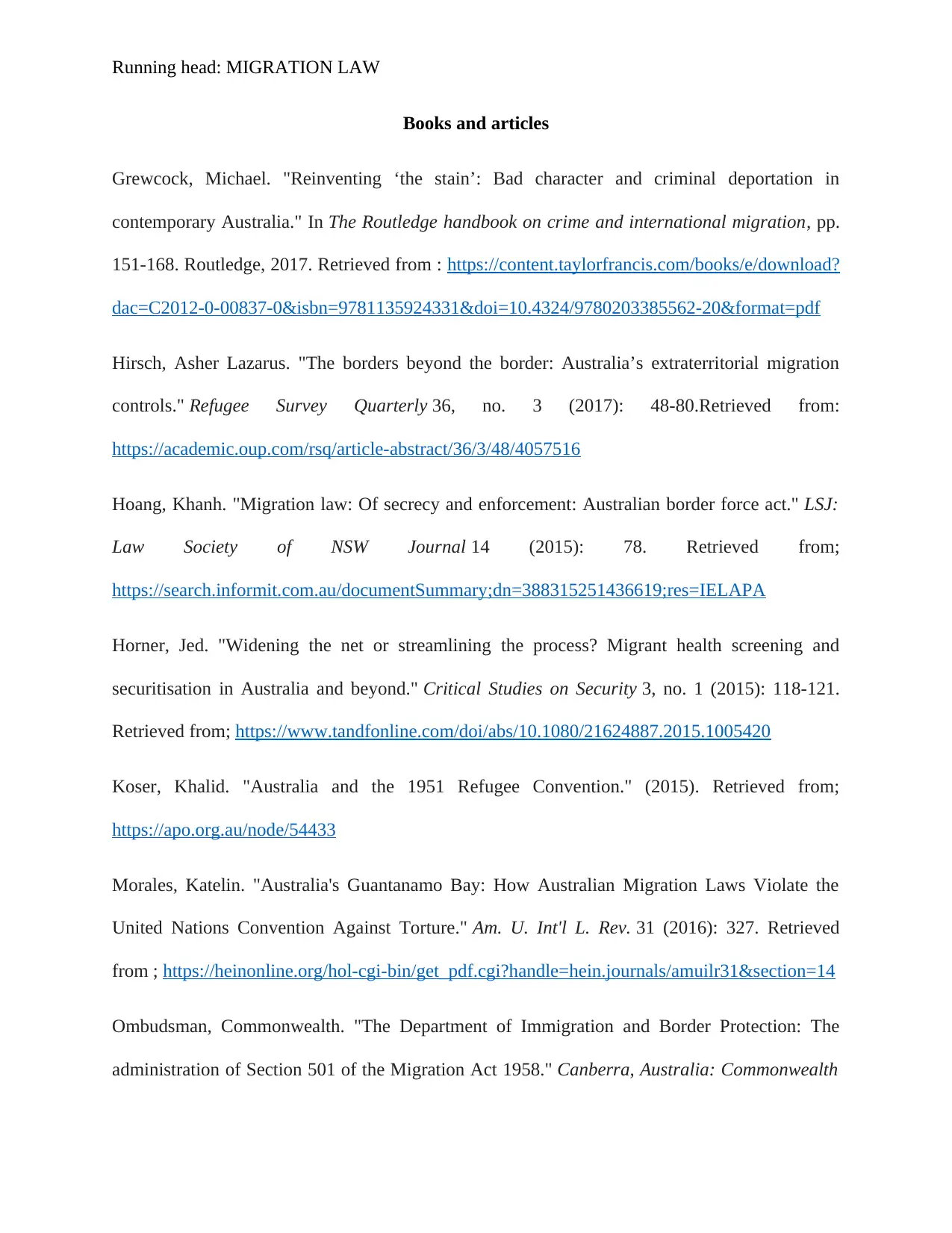
Running head: MIGRATION LAW
Books and articles
Grewcock, Michael. "Reinventing ‘the stain’: Bad character and criminal deportation in
contemporary Australia." In The Routledge handbook on crime and international migration, pp.
151-168. Routledge, 2017. Retrieved from : https://content.taylorfrancis.com/books/e/download?
dac=C2012-0-00837-0&isbn=9781135924331&doi=10.4324/9780203385562-20&format=pdf
Hirsch, Asher Lazarus. "The borders beyond the border: Australia’s extraterritorial migration
controls." Refugee Survey Quarterly 36, no. 3 (2017): 48-80.Retrieved from:
https://academic.oup.com/rsq/article-abstract/36/3/48/4057516
Hoang, Khanh. "Migration law: Of secrecy and enforcement: Australian border force act." LSJ:
Law Society of NSW Journal 14 (2015): 78. Retrieved from;
https://search.informit.com.au/documentSummary;dn=388315251436619;res=IELAPA
Horner, Jed. "Widening the net or streamlining the process? Migrant health screening and
securitisation in Australia and beyond." Critical Studies on Security 3, no. 1 (2015): 118-121.
Retrieved from; https://www.tandfonline.com/doi/abs/10.1080/21624887.2015.1005420
Koser, Khalid. "Australia and the 1951 Refugee Convention." (2015). Retrieved from;
https://apo.org.au/node/54433
Morales, Katelin. "Australia's Guantanamo Bay: How Australian Migration Laws Violate the
United Nations Convention Against Torture." Am. U. Int'l L. Rev. 31 (2016): 327. Retrieved
from ; https://heinonline.org/hol-cgi-bin/get_pdf.cgi?handle=hein.journals/amuilr31§ion=14
Ombudsman, Commonwealth. "The Department of Immigration and Border Protection: The
administration of Section 501 of the Migration Act 1958." Canberra, Australia: Commonwealth
Books and articles
Grewcock, Michael. "Reinventing ‘the stain’: Bad character and criminal deportation in
contemporary Australia." In The Routledge handbook on crime and international migration, pp.
151-168. Routledge, 2017. Retrieved from : https://content.taylorfrancis.com/books/e/download?
dac=C2012-0-00837-0&isbn=9781135924331&doi=10.4324/9780203385562-20&format=pdf
Hirsch, Asher Lazarus. "The borders beyond the border: Australia’s extraterritorial migration
controls." Refugee Survey Quarterly 36, no. 3 (2017): 48-80.Retrieved from:
https://academic.oup.com/rsq/article-abstract/36/3/48/4057516
Hoang, Khanh. "Migration law: Of secrecy and enforcement: Australian border force act." LSJ:
Law Society of NSW Journal 14 (2015): 78. Retrieved from;
https://search.informit.com.au/documentSummary;dn=388315251436619;res=IELAPA
Horner, Jed. "Widening the net or streamlining the process? Migrant health screening and
securitisation in Australia and beyond." Critical Studies on Security 3, no. 1 (2015): 118-121.
Retrieved from; https://www.tandfonline.com/doi/abs/10.1080/21624887.2015.1005420
Koser, Khalid. "Australia and the 1951 Refugee Convention." (2015). Retrieved from;
https://apo.org.au/node/54433
Morales, Katelin. "Australia's Guantanamo Bay: How Australian Migration Laws Violate the
United Nations Convention Against Torture." Am. U. Int'l L. Rev. 31 (2016): 327. Retrieved
from ; https://heinonline.org/hol-cgi-bin/get_pdf.cgi?handle=hein.journals/amuilr31§ion=14
Ombudsman, Commonwealth. "The Department of Immigration and Border Protection: The
administration of Section 501 of the Migration Act 1958." Canberra, Australia: Commonwealth
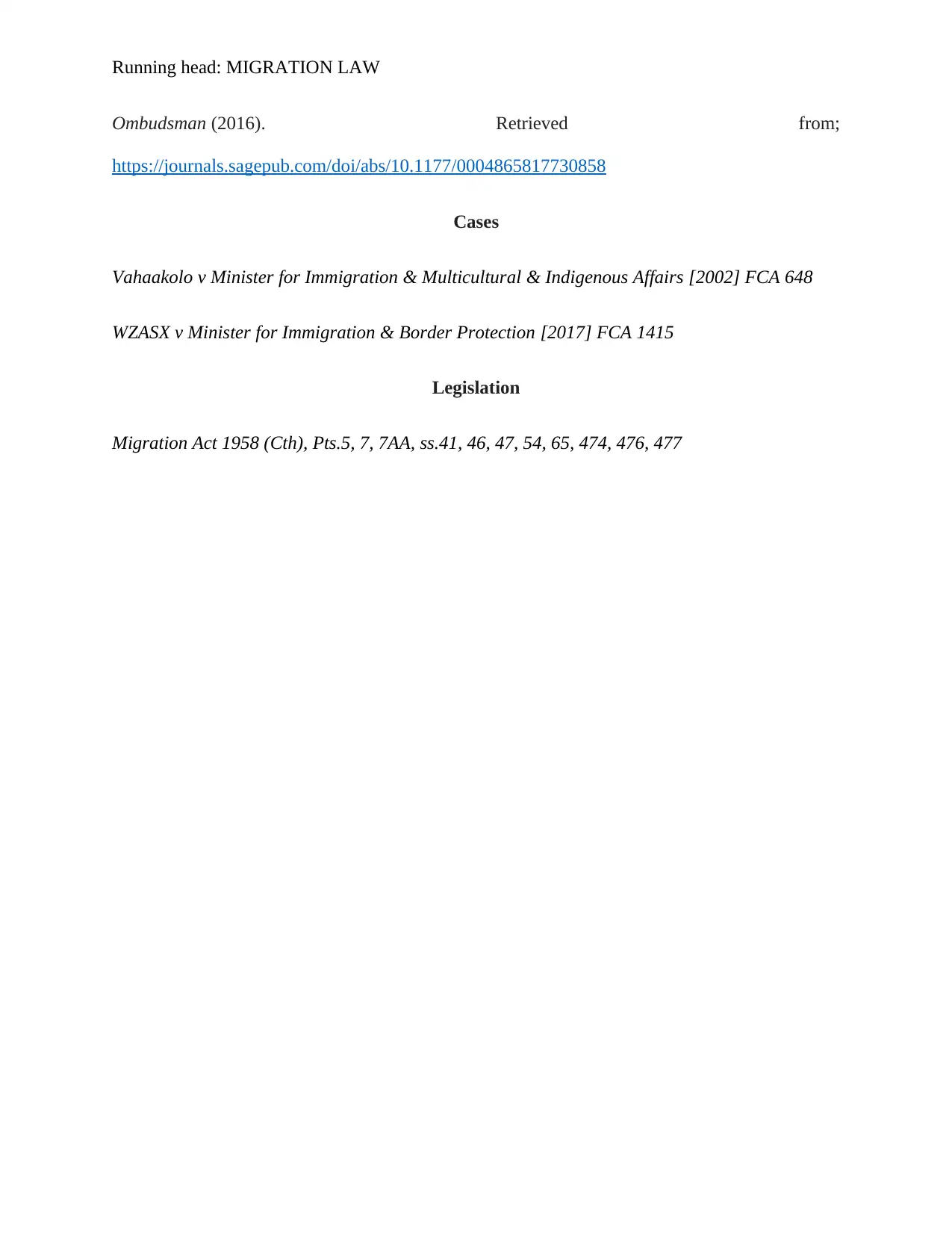
Running head: MIGRATION LAW
Ombudsman (2016). Retrieved from;
https://journals.sagepub.com/doi/abs/10.1177/0004865817730858
Cases
Vahaakolo v Minister for Immigration & Multicultural & Indigenous Affairs [2002] FCA 648
WZASX v Minister for Immigration & Border Protection [2017] FCA 1415
Legislation
Migration Act 1958 (Cth), Pts.5, 7, 7AA, ss.41, 46, 47, 54, 65, 474, 476, 477
Ombudsman (2016). Retrieved from;
https://journals.sagepub.com/doi/abs/10.1177/0004865817730858
Cases
Vahaakolo v Minister for Immigration & Multicultural & Indigenous Affairs [2002] FCA 648
WZASX v Minister for Immigration & Border Protection [2017] FCA 1415
Legislation
Migration Act 1958 (Cth), Pts.5, 7, 7AA, ss.41, 46, 47, 54, 65, 474, 476, 477
⊘ This is a preview!⊘
Do you want full access?
Subscribe today to unlock all pages.

Trusted by 1+ million students worldwide
1 out of 9
Related Documents
Your All-in-One AI-Powered Toolkit for Academic Success.
+13062052269
info@desklib.com
Available 24*7 on WhatsApp / Email
![[object Object]](/_next/static/media/star-bottom.7253800d.svg)
Unlock your academic potential
Copyright © 2020–2026 A2Z Services. All Rights Reserved. Developed and managed by ZUCOL.
![Implications of Le v Minister for Immigration [2019] FCCA 2167](/_next/image/?url=https%3A%2F%2Fdesklib.com%2Fmedia%2Fimages%2Fyq%2F3867d1a1ba4b437ba61ecfd169b6d5a2.jpg&w=256&q=75)
![Case Study: Le v Minister for Immigration [2019] - Migration Law 6](/_next/image/?url=https%3A%2F%2Fdesklib.com%2Fmedia%2Fimages%2Fzj%2Fa743e327dff34686a3247c65cadedd0a.jpg&w=256&q=75)



